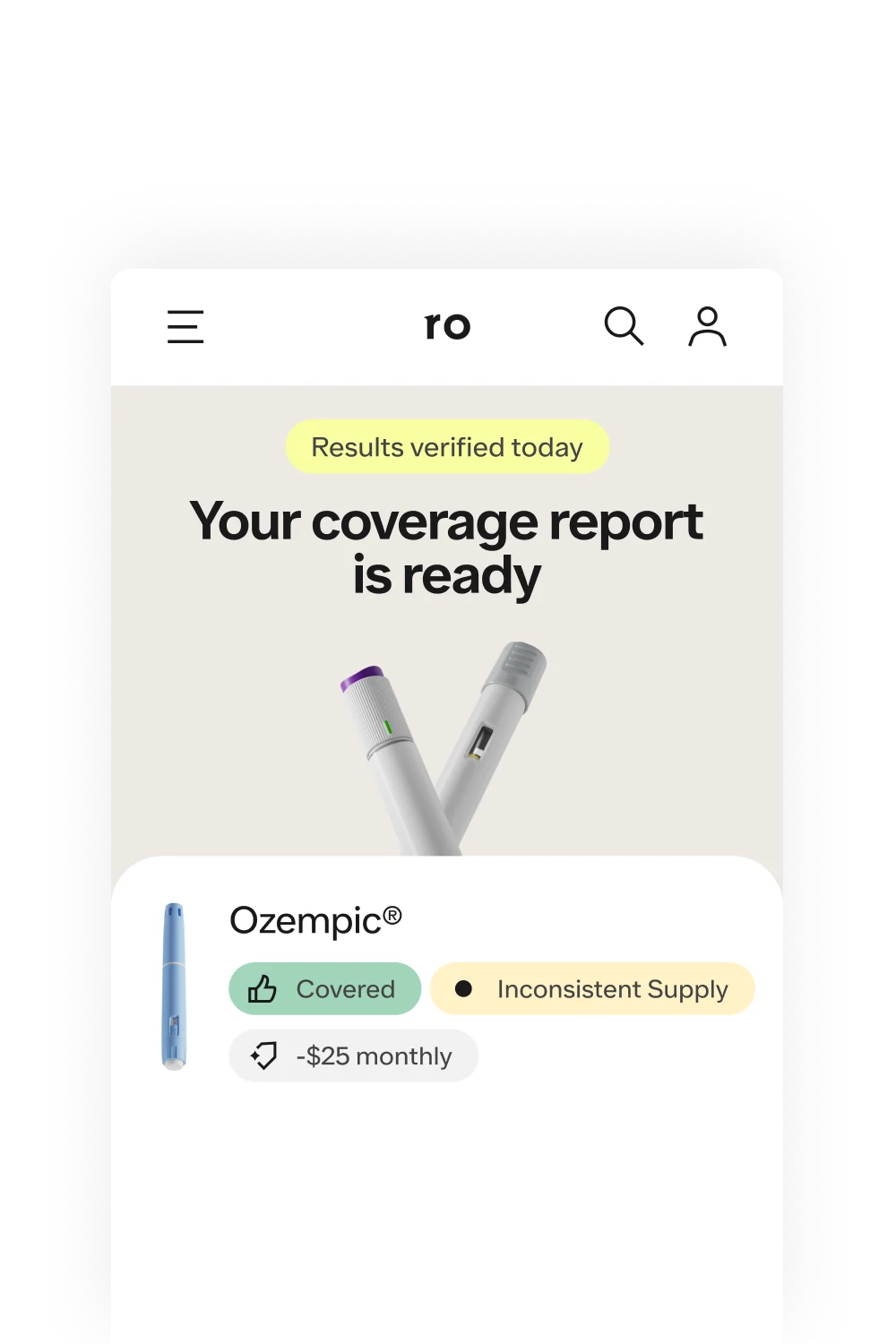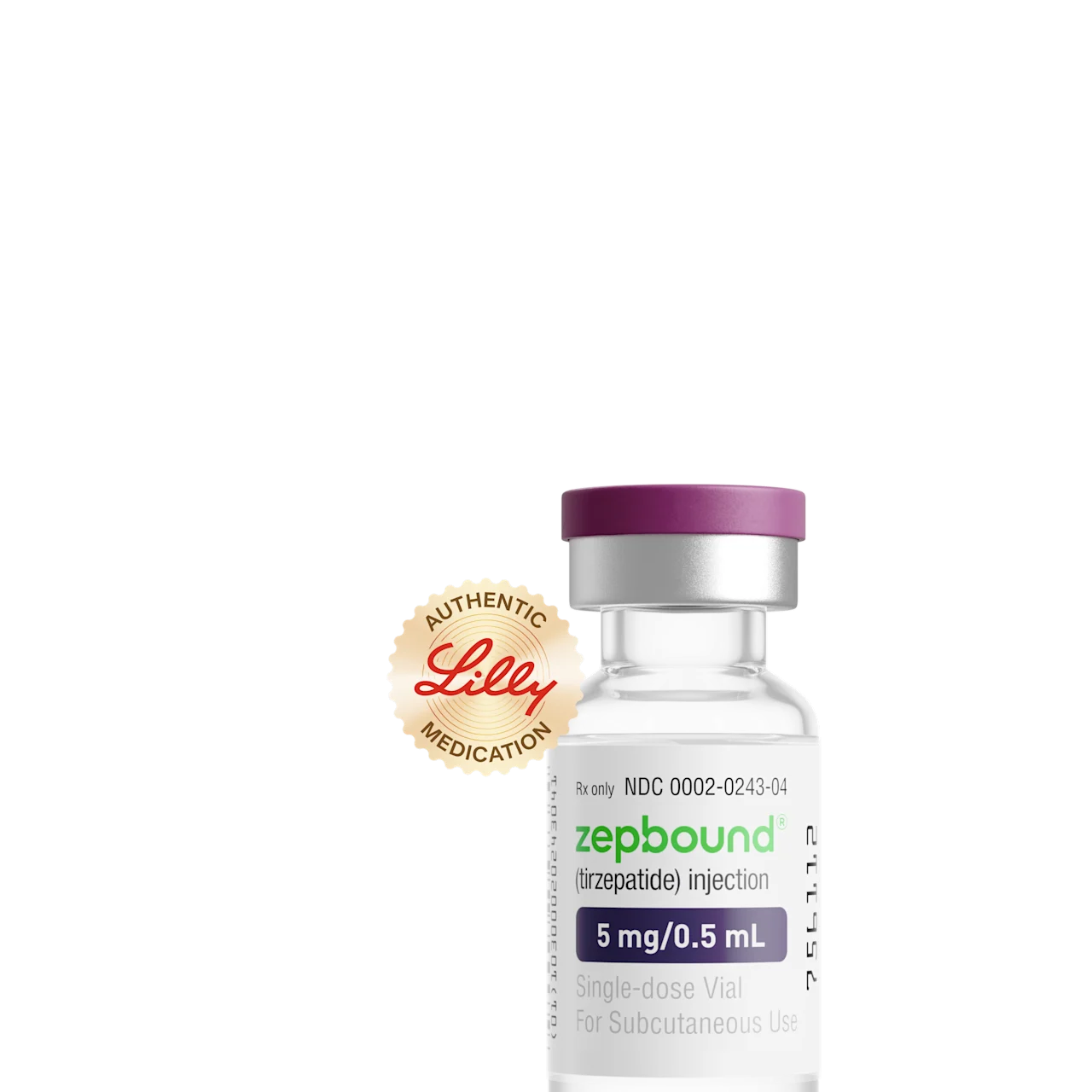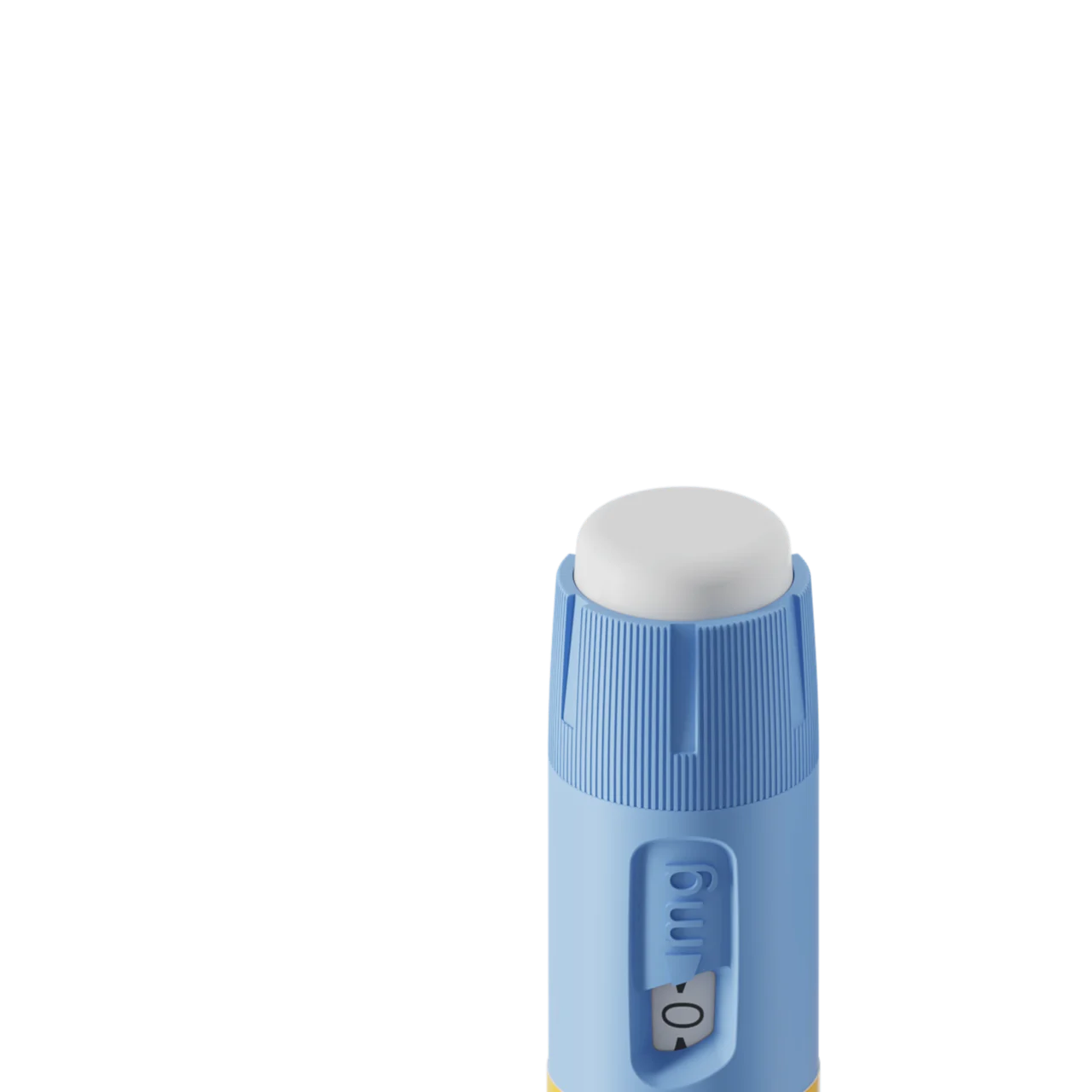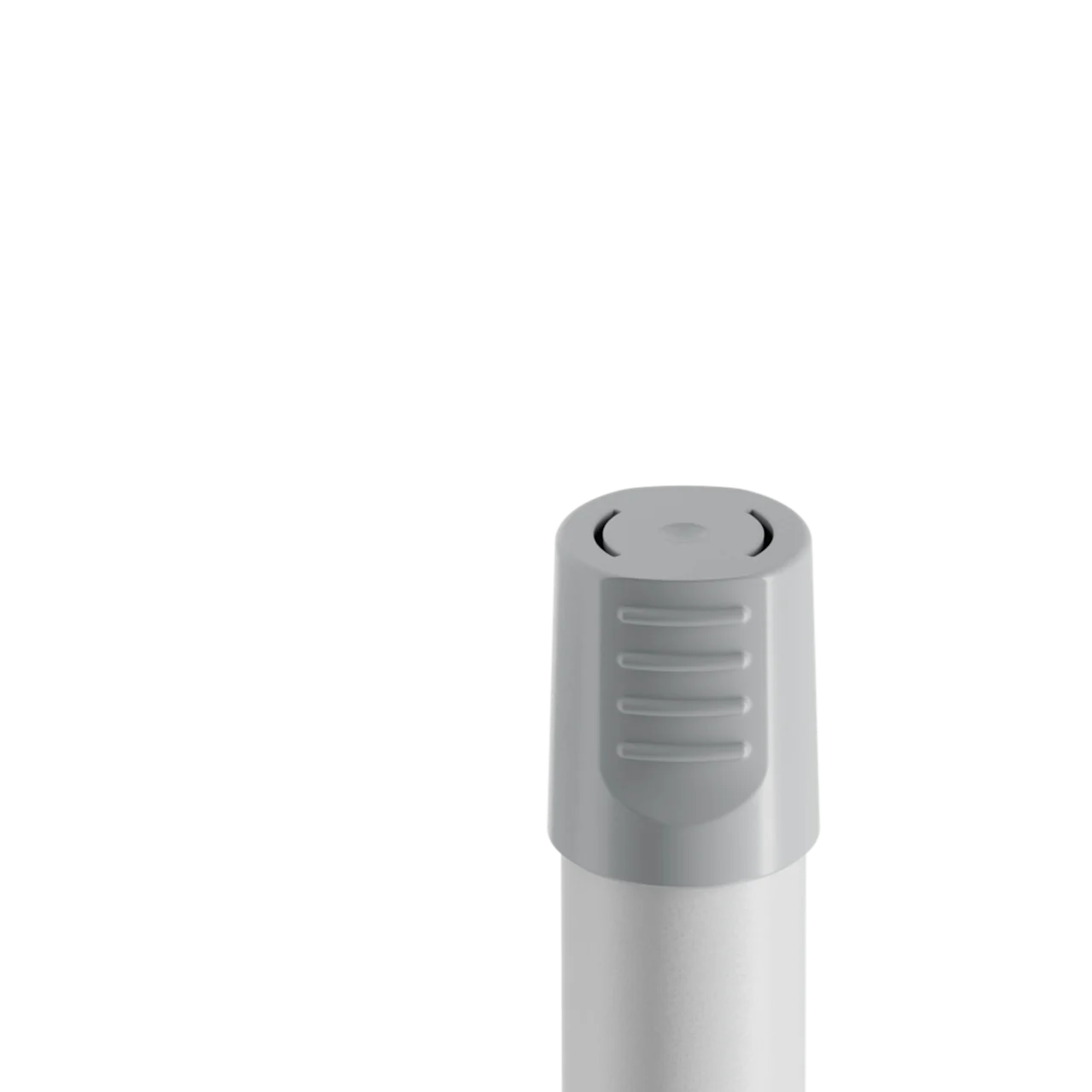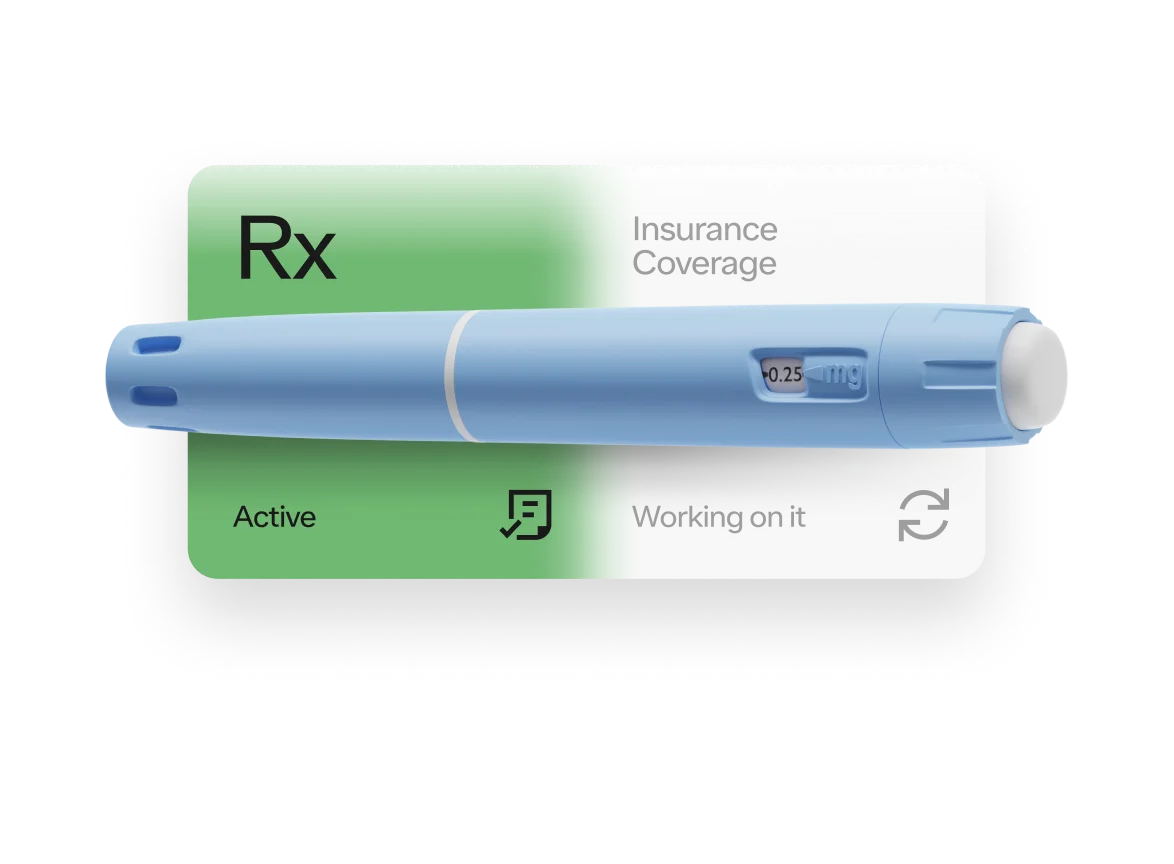Key takeaways
GLP-1 agonists are a class of drugs that were originally designed to treat type 2 diabetes, but their use has expanded to include weight loss, heart and kidney disease risk reduction, and management of obstructive sleep apnea.
These drugs work by mimicking GLP-1, a naturally occurring hormone made in the intestines.
Several different GLP-1 medications are approved specifically for weight loss, including Wegovy, Saxenda, and Zepbound. These drugs work by slowing digestion, keeping blood sugar levels steady, and reducing food cravings.
The most common side effects of these medications are gastrointestinal (GI) issues like nausea, diarrhea, and abdominal pain.
GLP-1 medications can cost more than $1000 each month before insurance or other discounts. Health insurance doesn't always cover GLP-1 medications when they're prescribed for weight loss.
Here's what we'll cover
Here's what we'll cover
Key takeaways
GLP-1 agonists are a class of drugs that were originally designed to treat type 2 diabetes, but their use has expanded to include weight loss, heart and kidney disease risk reduction, and management of obstructive sleep apnea.
These drugs work by mimicking GLP-1, a naturally occurring hormone made in the intestines.
Several different GLP-1 medications are approved specifically for weight loss, including Wegovy, Saxenda, and Zepbound. These drugs work by slowing digestion, keeping blood sugar levels steady, and reducing food cravings.
The most common side effects of these medications are gastrointestinal (GI) issues like nausea, diarrhea, and abdominal pain.
GLP-1 medications can cost more than $1000 each month before insurance or other discounts. Health insurance doesn't always cover GLP-1 medications when they're prescribed for weight loss.
Glucagon-like peptide-1 receptor agonists, or GLP-1 agonists, are a class of drugs that started as a diabetes treatment and then evolved into a popular weight loss tool—but the potential benefits didn’t stop there. In recent years, research has shown that GLP-1s may help with a variety of conditions, including obstructive sleep apnea, heart disease, and chronic kidney disease.
Today, these drugs are helping millions of people gain better control over their blood sugar, lose weight, and reduce cardiovascular and other health risks.
“GLP-1 agonists are some of the most powerful medicines for weight management that we have to offer,” says Dr. Raoul Manalac, senior director of clinical experience for metabolic health at Ro.
You might have read about GLP-1 drugs and wondered whether they might be a good option for you. Read on to learn more about this class of medications, how they work, their role in weight loss, and other health benefits they offer.
Rx weight loss with Ro
Get access to prescription weight loss medication online
What is GLP-1?
GLP-1 is short for glucagon-like peptide-1. It's a type of hormone that cells in your intestines release after you eat.
Once in your bloodstream, the GLP-1 hormone can:
Increase the production of insulin, a hormone that moves glucose (sugar) from your bloodstream into your cells
Block the release of glucagon, another hormone that works in tandem with insulin to help regulate your blood sugar
Slow gastric emptying, or the rate at which food moves from your stomach to your lower intestine
List of GLP-1 medications
There are several different GLP-1 medications on the market. Below are examples of GLP-1 agonists commonly prescribed for diabetes or weight loss.
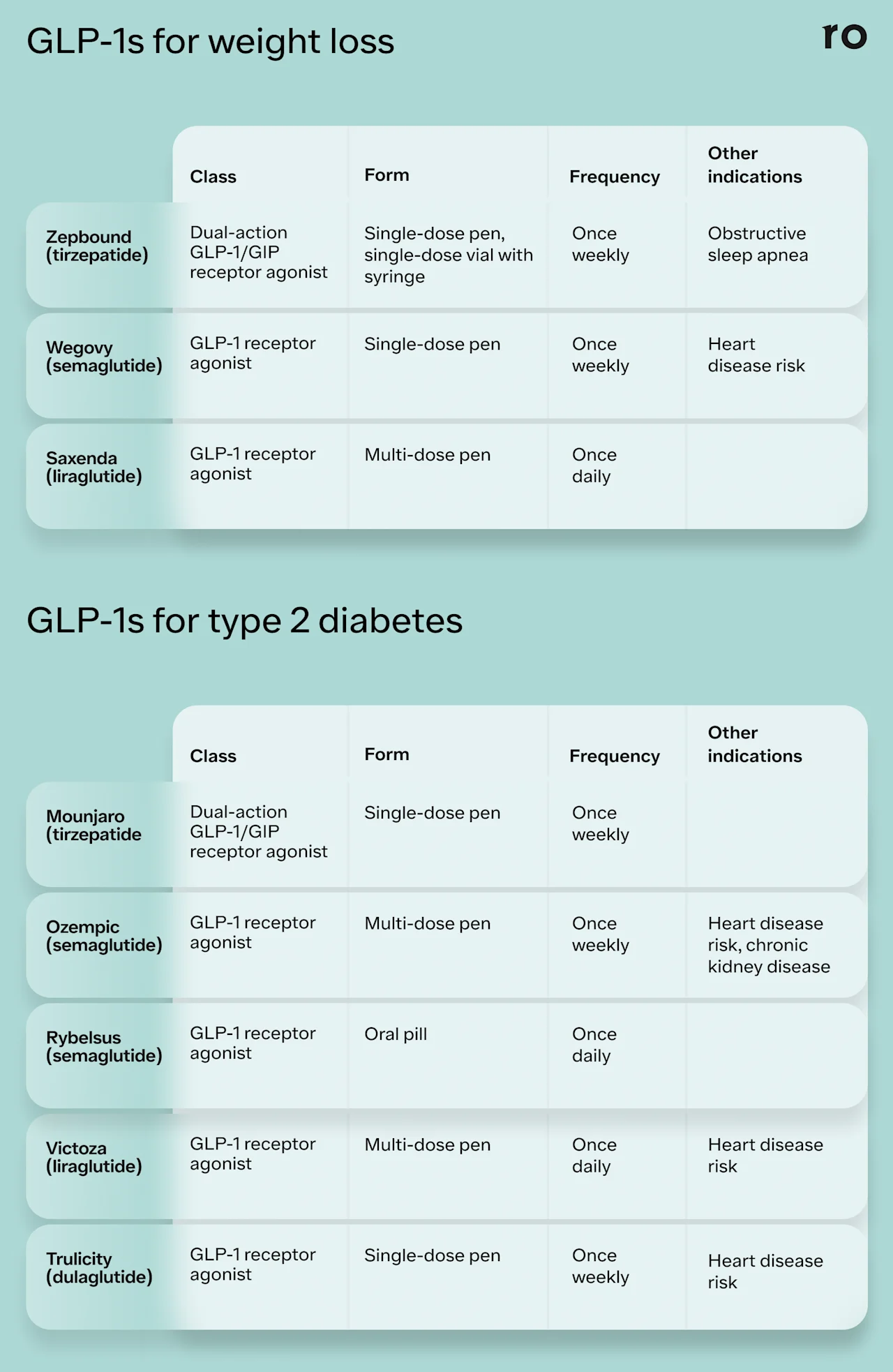
Semaglutide (Ozempic, Wegovy, Rybelsus)
Semaglutide comes in three brand names with different uses and delivery methods:
Ozempic is approved for improving blood sugar control in adults with type 2 diabetes, and for reducing the risk for heart problems and end-stage kidney disease in those with diabetes. It comes as a pre-filled injection pen that you give yourself once a week.
Wegovy is approved for weight loss in adults and children ages 12 and over with obesity, and for adults with overweight plus at least one weight-related condition (such as type 2 diabetes or heart disease). It also helps to reduce the risk of heart attack, stroke, and cardiovascular death in people with obesity or overweight. It also comes as a once-weekly injection.
Rybelsus also helps to control type 2 diabetes, but you take it as a once-daily pill. It's the first and only oral GLP-1 drug, but there may be oral GLP-1s for weight loss coming down the research pipeline.
Tirzepatide (Mounjaro, Zepbound)
Tirzepatide belongs to a different class of drugs called dual-action GLP-1/GIP receptor agonists. It acts on two hormone receptors: GLP and glucose-dependent insulinotropic polypeptide (GIP). Research suggests that the dual receptor action may make this class of drugs more effective at promoting weight loss than other GLP-1s.
Tirzepatide is available as two brand-name drugs:
Mounjaro is indicated to treat type 2 diabetes in adults. It comes in a single-use self-injectable pen that you take once per week.
Zepbound is a weekly injectable weight-loss drug for adults with obesity or overweight plus another weight-related condition. In 2024 it was also approved to treat obstructive sleep apnea in adults with obesity. Zepbound comes as either a single-dose pen or in a single-use vial that you inject with a syringe.
Liraglutide (Saxenda, Victoza)
Liraglutide was originally approved to treat diabetes. Later, it also gained approval for weight management. It's available under two brand names:
Saxenda is approved for weight loss in adults and children ages 12 and up with obesity and for adults with overweight plus at least one weight-related condition. Unlike other weekly GLP-1s, Saxenda comes as a daily injection.
Victoza is approved for blood sugar control in adults with type 2 diabetes. This GLP-1 drug also reduces the risk of heart attack and stroke in people with diabetes and cardiovascular disease. Victoza comes in a self-injectable pen that you take once daily.
Dulaglutide (Trulicity)
Dulaglutide is another medication for type 2 diabetes. While it promotes some weight loss, it is not indicated for that purpose. Dulaglutide is available under one brand name:
Trulicity is approved for blood sugar control in adults and children aged 10 and older with type 2 diabetes. It’s also approved to reduce the risk for major cardiovascular events (heart attack, stroke) in adults with type 2 diabetes who also have heart disease.
How do GLP-1 drugs work for weight loss?
These drugs work by mimicking the GLP-1 hormone and binding to GLP-1 receptors in the brain and gut.

"In the brain, it's thought to reduce food intake by some element of appetite suppression," says Evan Nadler, MD, MBA, former co-director of the obesity program at Children's National Hospital and current adjunct associate professor at George Washington University. "Lots of people describe it as decreasing 'food noise,' which means how much you think about food and how much you crave different foods."
In the gut, GLP-1 slows the rate at which digested food empties from the stomach and moves through the digestive tract, Dr. Nadler adds. When food stays in your stomach, you may feel full for longer, which can reduce your overall food/calorie intake.
GLP-1s help to stimulate insulin release and reduce glucagon production. This dual action not only helps to regulate blood sugar levels, but it may also promote weight loss.
GLP-1 drugs might also promote weight loss by reducing the amount of visceral fat — the type of fat that surrounds organs and can contribute to conditions like obesity, fatty liver disease, and diabetes. A review of 30 randomized controlled trials that included 1,736 people with type 2 diabetes or non-alcoholic fatty liver disease found that treatment with GLP-1 agonists significantly reduced both visceral and liver fat.
Other health benefits of GLP-1s
The potential health benefits of GLP-1s go beyond weight loss and blood sugar control. Some of these drugs are now also approved to reduce the risk of heart attacks, strokes, and heart-related deaths in certain populations.
"There are GLP-1 receptors in the heart, and so these cardiovascular effects are probably[due to] a combination of weight loss and indirect effects on the heart," Dr. Nadler says. GLP-1 agonists might protect the heart indirectly through their effects on weight, blood sugar, blood pressure, and inflammation.
Newer research suggests that semaglutide may also have a protective effect on the kidneys. In 2025, Ozempic was approved by the US Food and Drug Administration (FDA) to reduce the risk of worsening kidney disease and kidney failure in people with type 2 diabetes.
Which GLP-1 drugs are most effective for weight loss?
While all GLP-1 medications may promote some weight loss, three drugs are specifically indicated for chronic weight management: Zepbound (tirzepatide), Wegovy (semaglutide), and Saxenda (liraglutide).
Multiple clinical trials have found that each of these medications can help people lose 5-20% or more of their body weight—though research suggests that some may be more effective than others.
One clinical trial compared the weight loss outcomes for semaglutide vs. liraglutide. At 68 weeks, participants taking 2.4 mg of semaglutide (Wegovy) weekly lost 15.8% of their body weight, compared to 6.4% for participants taking 3 mg of liraglutide (Saxenda).
In a recent trial studying the effectiveness of tirzepatide (Zepbound) for weight loss, participants lost an average of 20.9% of their body weight at 36 weeks.
Another trial comparing tirzepatide vs. semaglutide for weight loss found that people taking tirzepatide experienced greater weight loss at three, six, and 12 months of treatment. Participants taking tirzepatide lost an average of 15.3% of their body weight after a year, while those on semaglutide lost about 8.3%.
A recent head-to-head clinical trial comparing Wegovy and Zepbound returned similar results. Early findings from that study suggest that treatment with Zepbound may lead to greater weight loss overall.
While these outcomes are impressive, keep in mind that every weight loss journey is unique—the amount of weight you can lose on Zepbound or any other GLP-1 depends on a variety of factors, including your starting weight, overall health, lifestyle, and more.
Experts also note that these weight loss injections aren’t meant to work in isolation. To maximize the benefits of these drugs, pair them with lifestyle changes like a well-balanced diet and regular exercise.
GLP-1 side effects
All of the GLP-1s went through an extensive clinical review and approval process and are considered generally safe medications. The most common side effects of these drugs are mild gastrointestinal (GI) issues.
Some common GLP-1 side effects may include:
Side effects may be more intense when you first start taking the medication but they often go away over time. Starting at the lowest dose and increasing the dose gradually over time may help to minimize side effects.
Your healthcare provider can give you advice on the safe use of these medications. They can also recommend tips to help manage mild side effects. This might include:
Eating smaller meals to help your body adjust to slower digestion
Drinking more water to help prevent dehydration
Getting more fiber in your diet to help with constipation
Taking an anti-nausea medication to help with vomiting or queasiness
Avoiding certain foods, such as rich, greasy, or sugary foods that can worsen digestive side effects
Rare but serious side effects and warnings
These drugs may also come with some rare but serious side effects, including:
Diabetic retinopathy complications in people with type 2 diabetes. This eye disease occurs when diabetes damages blood vessels in the retina.
Gallbladder disease. Gallstones and gallbladder inflammation have been reported in some studies of these medications.
Low blood sugar (hypoglycemia). People who take both a GLP-1 medication for weight loss and a sulfonylurea drug to treat diabetes may experience dangerously low blood sugar levels.
Pancreatitis. Sudden inflammation of the pancreas may occur with these medications, though it is rare.
Allergic reactions. Severe reactions—including anaphylaxis—can occur in people who are allergic to ingredients in GLP-1 medications.
Thyroid tumors. GLP-1s increased the risk for thyroid C-cell tumors in studies of lab rats, but whether they cause these cancers in humans is unknown.
Gastroparesis. Some research has shown that GLP-1s may cause gastroparesis, or stomach paralysis, in some people.
Who shouldn’t take GLP-1s?
GLP-1s may not be suitable for everyone. You shouldn’t take these medications if you:
Are pregnant, breastfeeding, or trying to get pregnant
Have a family or personal history of medullary thyroid cancer or multiple endocrine neoplasia type 2 (MEN 2)
Have a known allergy to any ingredients in the medication
Have a personal or family history of pancreatitis
GLP-1 agonists cost and accessibility
While these drugs can be highly effective, they can also be expensive. GLP-1s can cost up to $1,000 or more each month before insurance, savings cards, or other discounts.
While most insurance companies will cover GLP-1s when used for diabetes, they aren't always covered for weight loss, meaning people may have to pay for these drugs out of pocket.
Below are the current list prices for a one-month supply of popular GLP-1s:
Zepbound single-dose pens: $1,086.37
Zepbound vials (2.5 mg, 5 mg): $349-$499
Mounjaro: $1079.77
Ozempic: $997.58
Saxenda: $1349.02
If your insurance does cover weight loss medications, manufacturer savings programs may help reduce these costs significantly. Online drug retailers may also offer pharmacy coupons to help offset out-of-pocket costs, and telehealth providers such as Ro’s Body Program membership can also help lower the cost of these medications.
How do GLP-1s compare to other weight loss medications?
While GLP-1 drugs are capturing headlines, they aren't the only medications approved for weight loss.
"There are some older-generation drugs that are safe and effective and are still in use," says Dr. Nadler. "When I talk to patients about weight management, I always bring up these other options as well, because some people don't want to use a needle."
Older prescription weight loss pills include:
Hydrogel (Plenity)
Naltrexone-bupropion (Contrave)
Orlistat (Xenical)
Phentermine (Adipex, Suprenza)
Phentermine topiramate (Qsmyia)
While the GLP-1 agonists can produce a weight loss of 10% to 20%, the average weight lost with older medications is lower—in the range of 5% to 10% of the starting body weight.
The side effects also differ. For example, phentermine can cause a rapid or irregular heart rate, high blood pressure, headache, and insomnia. Possible Orlistat side effects include gas, increased bowel movements, and fecal incontinence.
Who should consider GLP-1 drugs for weight loss?
You may be a good candidate for GLP-1 treatment if you:
Have been diagnosed with type 2 diabetes
Have obesity, or a body mass index (BMI) of 30 or higher
Have overweight (a BMI of 25 to 29.9) plus at least one weight-related condition, such as heart disease or type 2 diabetes
Ultimately the decision to start treatment for weight loss is up to you and your healthcare provider. They can review factors like your personal and family health history, current weight, and health conditions to determine if GLP-1 therapy is right for you.
What to expect when starting GLP-1 therapy
If your provider prescribes a GLP-1, they’ll likely start you at the lowest dose of your medication. They may also show you how to administer your first injection.
In the first few weeks on the drug, you may experience mild side effects as your body starts to adjust to the medication. You may also begin to notice changes in your appetite and weight, but it can take time before you see more dramatic weight loss results. For context, in one study of 175 people with overweight or obesity, participants lost an average of 15 pounds (about 6% of their body weight) within three months on semaglutide, and 27 pounds (about 11% of their body weight) after six months on this medication.
Recommended lifestyle changes during GLP-1 therapy
GLP-1 medications can boost weight loss by increasing satiety and reducing food cravings. To maximize results, experts recommend pairing this treatment with lifestyle changes like increased physical activity and a balanced, nutritious diet.
“These [medications] can help patients feel more full for longer or more full on less food,” says Dr. Manalac. “This can help patients feel more confident about making lifestyle changes—particularly dietary changes that play an important role in weight management.”
Monitoring and follow-up with a healthcare provider
While on any of these drugs, you'll need regular monitoring from your provider. When you first get started on medication, your provider will work with you to adjust your medication dose. They will increase, or titrate, the dose until it is effective. Then you'll see your doctor at regular intervals so they can monitor you for side effects, track your progress, and monitor for any potential adverse effects.
Considerations for long-term use
GLP-1 drugs for weight loss aren't a quick fix. They require long-term use to maintain results, and stopping these medications too soon can lead to weight gain or issues with blood sugar control.
In one study, 1,961 adults with obesity or overweight plus at least one weight-related medical condition regained two-thirds of the weight they had lost within one year of stopping semaglutide treatment and lifestyle interventions.
How to get started with GLP-1 therapy
Talk to your healthcare provider if you’re interested in taking a GLP-1 medication for weight loss. They can evaluate whether you’re a good candidate for one of these medications based on your goals, health, and personal and family health history.
Here are a few questions to ask before getting a prescription for weight loss medication:
Which weight loss medication is most appropriate for me?
How much weight can I expect to lose on the medicine?
What are the possible side effects?
How do I manage side effects if I have them?
Will my health insurance cover the cost?
How might this medication interact with other drugs I take?
How will you monitor me while I'm on the medicine?
What dietary changes should I make while taking the medicine?
What types of exercise should I do, and how often should I work out?
Bottom line
GLP-1 drugs can be effective tools for weight loss and blood sugar control. While they work in similar ways, there are a few key differences between each drug or brand that could impact whether these medications are a good option for you.
Have a conversation with your healthcare provider about weight loss medications, how they work, and their potential risks. They can determine whether one of these medications might be a good fit for you based on your health history, weight loss goals, and other factors.
GLP-1 agonists can treat multiple health conditions. These drugs were first approved to help regulate blood sugar in people with type 2 diabetes but were later discovered to promote weight loss, among other health benefits.
All of these medications mimic the GLP-1 hormone, which helps to reduce appetite, make you feel full faster, and improve blood sugar control. Dual-action GLP-1/GIP receptor agonists like Zepbound can also mimic the action of GIP, a hormone that helps regulate blood sugar levels and metabolism.
All GLP-1 drugs have similar side effects. The most common are GI issues like nausea, vomiting, and constipation. Common side effects tend to be mild and go away the longer you are on the medication.
These drugs are meant to be taken long-term. Stopping them too soon may make you regain the weight you lost.
GLP-1 agonists can cost $1,000 or more each month and many insurance providers don’t cover the cost when they're prescribed for weight loss. Savings programs, coupons, and other discounts may help make these drugs more affordable.
Frequently asked questions (FAQs)
What does GLP-1 do?
GLP-1, or glucagon-like peptide-1, is a type of gut hormone that our bodies release after we eat. GLP-1 serves a variety of functions in the pancreas, gut, and brain, including:
Stimulating insulin production in the pancreas and suppressing glucagon production in the liver
Dampening hunger cues in the brain
Slowing down the rate at which food moves from your stomach to your lower intestine
Is GLP-1 similar to Ozempic?
Ozempic is one type of GLP-1 agonist. It works by mimicking the GLP-1 hormone our bodies naturally make.
Which GLP-1 is best for weight loss?
Research suggests that tirzepatide is more effective at promoting weight loss than older GLP-1 medications like semaglutide. In one observational study that included more than 18,000 people with type 2 diabetes and obesity or overweight, those who took tirzepatide lost 15% or more of their body weight after 12 months of treatment compared to an 8.3% weight loss with semaglutide.
How to get GLP-1 naturally?
Cells in our intestines naturally make GLP-1. The GLP-1 agonist medications simulate the effects of this drug in the body. While no medication or supplement directly provides GLP-1, research suggests that foods and supplements like berberine, curcumin, cinnamon, resveratrol, and whole wheat may help boost levels of this hormone in the body.
Which drugs are considered GLP-1?
Current GLP-1 medications on the market include:
Zepbound
Mounjaro
Ozempic
Wegovy
Rybelsus
Saxenda
Victoza
Trulicity
Is metformin a GLP-1 drug?
No. Metformin belongs to a class of drugs called biguanides. It treats diabetes by reducing the amount of glucose (sugar) the body produces in the liver and absorbs from food.
DISCLAIMER
If you have any medical questions or concerns, please talk to your healthcare provider. The articles on Health Guide are underpinned by peer-reviewed research and information drawn from medical societies and governmental agencies. However, they are not a substitute for professional medical advice, diagnosis, or treatment.
GLP-1 Important Safety Information: Read more about serious warnings and safety info.
Ozempic Important Safety Information: Read more about serious warnings and safety info.
Wegovy Important Safety Information: Read more about serious warnings and safety info.
Mounjaro Important Safety Information: Read more about serious warnings and safety info.
Zepbound Important Safety Information: Read more about serious warnings and safety info.
Saxenda Important Safety Information: Read more about serious warnings and safety info.
Aronne, L. J., Sattar, N., Horn, D. B., et al. (2024). Continued Treatment With Tirzepatide for Maintenance of Weight Reduction in Adults With Obesity: The SURMOUNT-4 Randomized Clinical Trial. JAMA, 331(1), 38–48. doi: 10.1001/jama.2023.24945. Retrieved from https://jamanetwork.com/journals/jama/fullarticle/2812936
Eli Lilly and Company-a. (2024). Highlights of Prescribing Information for Trulicity. Retrieved from https://uspl.lilly.com/trulicity/trulicity.html#pi
Eli Lilly and Company. (2025). How Much Should I Expect to Pay for Mounjaro (Tirzepatide). Retrieved from https://pricinginfo.lilly.com/mounjaro
Eli Lilly and Company-b. (2024). How Much Should I Expect to Pay for Zepbound (Tirzepatide). Retrieved from https://pricinginfo.lilly.com/zepbound
Eli Lilly and Company-c. (2024). Lilly's Zepbound® (tirzepatide) superior to Wegovy® (semaglutide) in head-to-head trial showing an average weight loss of 20.2% vs. 13.7% [press release]. Retrieved from https://investor.lilly.com/news-releases/news-release-details/lillys-zepboundr-tirzepatide-superior-wegovyr-semaglutide-head
Ghusn, W., De la Rosa, A., Sacoto, D., et al. (2022). Weight loss Outcomes Associated with Semaglutide Treatment for Patients with Overweight or Obesity. JAMA Network Open, 5(9), e2231982. doi: 10.1001/jamanetworkopen.2022.31982. Retrieved from https://jamanetwork.com/journals/jamanetworkopen/fullarticle/2796491
Kommu, S. & Whitfield, P. (2024). Semaglutide. StatPearls. Retrieved from https://www.ncbi.nlm.nih.gov/books/NBK603723/
Latif, W., Lambrinos, K. J., Patel, P., et al. (2024). Compare and Contrast the Glucagon-Like Peptide-1 Receptor Agonists (GLP1RAs). StatPearls. Retrieved from https://www.ncbi.nlm.nih.gov/books/NBK572151/
Liao, C., Liang, X., Zhang, X., et al. (2023). The Effects of GLP-1 Receptor Agonists on Visceral Fat and Liver Ectopic Fat in an Adult Population With or Without Diabetes and Nonalcoholic Fatty Liver Disease: A Systematic Review and Meta-Analysis. PLoS One, 18(8), e0289616. doi: 10.1371/journal.pone.0289616. Retrieved from https://pmc.ncbi.nlm.nih.gov/articles/PMC10449217/
NAIC. (2024). Does Insurance Cover Prescription Weight Loss Injectables? Retrieved from https://content.naic.org/article/does-insurance-cover-prescription-weight-loss-injectables
Novo Nordisk. (2025). FDA approves Ozempic® (semaglutide) as the only GLP-1 RA to reduce the risk of worsening kidney disease and cardiovascular death in adults with type 2 diabetes and chronic kidney disease [press release]. Retrieved from https://www.ozempic.com/content/dam/diabetes-patient/ozempic/pdfs/Ozempic_CKD_sNDA_Press_Release_January_28_2025.pdf
Novo Nordisk-a. (2024). Find out the cost for Ozempic. Retrieved from https://www.novocare.com/diabetes/products/ozempic/explaining-list-price.html
Novo Nordisk. (2023). What is the list price for Saxenda and will it impact me? Retrieved from https://www.novocare.com/obesity/products/saxenda/explaining-list-price.html
Novo Nordisk-b. (2024). What is the list price for Wegovy and will it impact me? Retrieved from https://www.novocare.com/obesity/products/wegovy/let-us-help/explaining-list-price.html
Novo-pi. (2025). Ozempic. Retrieved from https://www.novo-pi.com/ozempic.pdf
Novo-pi. (2024). Saxenda. Retrieved from https://www.novo-pi.com/saxenda.pdf
Novo-pi. (2024). Victoza. Retrieved from https://www.novo-pi.com/victoza.pdf
Obesity Medicine Association. (2024). Top Weight Loss Medications. Retrieved from https://obesitymedicine.org/blog/weight-loss-medications/
Perkovic, V., Tuttle, K. R., Rossing, P., et al. (2024). Effects of Semaglutide on Chronic Kidney Disease in Patients with Type 2 Diabetes. The New England Journal of Medicine, 391(2), 109–121. doi: 10.1056/NEJMoa2403347. Retrieved from https://www.nejm.org/doi/full/10.1056/NEJMoa2403347
Rodriguez, P. J., Cartwright, B. M. G., Gratzl, S., et al. (2024). Semaglutide vs. Tirzepatide for Weight Loss in Adults with Overweight or Obesity. JAMA Internal Medicine, 184(9), 1056-1064. doi: 10.1001/jamainternmed.2024.2525. Retrieved from https://pmc.ncbi.nlm.nih.gov/articles/PMC11231910/
Rubino, D. M., Greenway, F. L., Khalid, U., et al. (2022). Effect of Weekly Subcutaneous Semaglutide vs Daily Liraglutide on Body Weight in Adults With Overweight or Obesity Without Diabetes: The STEP 8 Randomized Clinical Trial. JAMA, 327(2), 138–150. doi: 10.1001/jama.2021.23619. Retrieved from https://jamanetwork.com/journals/jama/fullarticle/2787907
Scheen, A. J. (2023). Dual GIP/GLP-1 receptor agonists: New advances for treating type-2 diabetes. Annales d'Endocrinologie, 84(2), 316-321. https://doi.org/10.1016/j.ando.2022.12.423. Retrieved from https://www.sciencedirect.com/science/article/abs/pii/S0003426623000045
Sodhi, M., Rezaeianzadeh, R., Kezouh, A., et al. (2023). Risk of Gastrointestinal Adverse Events Associated With Glucagon-Like Peptide-1 Receptor Agonists for Weight Loss. JAMA, 330(18), 1795–1797. doi: 10.1001/jama.2023.19574. Retrieved from https://pmc.ncbi.nlm.nih.gov/articles/PMC10557026/
U.S. Federal Drug Administration (FDA-a). (2024). Highlights of Prescribing Information: Bydureon BCISE (exenatide) extended-release injectable suspension, for subcutaneous use. Retrieved from https://den8dhaj6zs0e.cloudfront.net/50fd68b9-106b-4550-b5d0-12b045f8b184/df5ddbd6-546b-43da-b794-56f711189aba/df5ddbd6-546b-43da-b794-56f711189aba_viewable_rendition__v.pdf
U.S. Federal Drug Administration (FDA-b). (2024). Highlights of Prescribing Information: BYETTA® (exenatide) injection, for subcutaneous use. Retrieved from https://den8dhaj6zs0e.cloudfront.net/50fd68b9-106b-4550-b5d0-12b045f8b184/ce8afab9-2b45-436d-957c-a73978d09e93/ce8afab9-2b45-436d-957c-a73978d09e93_viewable_rendition__v.pdf
Wharton, S., Blevins, T., Connery, L., et al. (2023). Daily Oral GLP-1 Receptor Agonist Orforglipron for Adults with Obesity. The New England Journal of Medicine, 389(10), 877–888. doi: 10.1056/NEJMoa2302392. Retrieved from https://pubmed.ncbi.nlm.nih.gov/37351564/
Wilding, J. P. H., Batterham, R. L., Davies, M., et al. (2022). Weight Regain and Cardiometabolic Effects After Withdrawal of Semaglutide: The STEP 1 Trial Extension. Diabetes, Obesity and Metabolism, 24(8), 1553-1564. https://doi.org/10.1111/dom.14725. Retrieved from https://dom-pubs.pericles-prod.literatumonline.com/doi/10.1111/dom.14725
Yaribeygi, H., Jamialahmadi, T., Moallem, S. A., et al. (2021). Boosting GLP-1 by Natural Products. Advances in Experimental Medicine and Biology, 1328, 513-522. doi: 10.1007/978-3-030-73234-9_36. Retrieved from https://pubmed.ncbi.nlm.nih.gov/34981502/
Zipursky, J. S., Bogler, T., & Maxwell, C. (2024). Glucagon-Like Peptide-1 Receptor Agonists During Pregnancy and Lactation. CMAJ, 196(43), E1413. https://doi.org/10.1503/cmaj.240768. Retrieved from https://www.cmaj.ca/content/196/43/E1413


